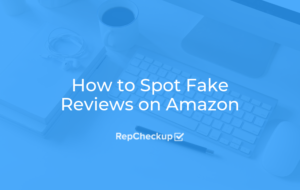
Do You Know How to Spot a Fake Online Review from a Mile Away?

Not all online reviews are created equal, and this is never more true than when an obvious fake review is left on one of your profiles. For many, a fake review is a seemingly inescapable blemish on their reputation. After all, online review websites are notorious for “overlooking” negative reviews and letting them fall in line with all the other reviews that have been flagged for removal. In these cases, business owners have to go through the same process of trying to prove the review is false and hoping that the website will agree.
However, with fake reviews, there are often a few dead-giveaways that can work in your favor when you try and get them removed from your profile. We’ve been in this business for a while, and I have even written an e-book titled “The Rise of Fake Patient Reviews,” where I investigated the phenomenon of fake reviews being left on doctor and medical provider profiles. This blog will pull information from that e-book to ultimately help you combat fake reviews on your own professional profiles.
What is a Fake Online Review?
This one may seem pretty obvious, but we defined “fake online reviews as any review that doesn’t come from a verified client, and they can be both negative and positive! This means that competitors, ex-employees, personal acquaintances, and your average internet troll are all capable of leaving a fake patient review that can impact the social standing of your business.”
So, now that we know that fake doesn’t always mean negative, we can talk about how you can spot these posts from a mile away!
The Fake Online Review is Aimed at Just One Person
It’s all too frequent that a fake online review is designed with one person in mind. These reviews are meant to tarnish the reputation of one specific person, like your leading sales guy or the head surgeon, in order to discredit the whole business. Sometimes, this even happens as a sort of sad vendetta where a competitor or “enemy” will leave a specific, negative review to attack one person.
These reviews are often angry, really specific, and mention one person at a time. They go for emotional appeals and try to dissuade potential clients by broadcasting a poor behavior or bad business practice (which is often made up).
The Fake Online Review is Too Specific
Now, it may be a little weird that we list reviews that are both too specific and too general as red flags, but think about it: overly specific reviews often go to the extremes when explaining their bad experience to shock real users when they read the review.
They’re a Serial Negative Online Reviewer:
Whenever you see a review that seems a little suspicious, take a minute to look at the reviewers profile. One thing that you may notice is that this user is what we call a “serial negativer reviewer.” This means that Anonymous Annie really loves leaving negative reviews for all the mechanics in her town (and while she’s on her travels too!).
You may notice that the negative reviews on this profile are located around a specific city and business-type. Pay close attention and ask yourself if you and all your competitors were targeted? If everyone but one was given a negative review, consider yourself the target of a competitor leaving fake negative reviews.
The Negative Online Review Doesn’t Make Sense
Sometimes, the easiest way to spot a fake review is to see how clearly it’s written. We’re not talking about a typo or two, or a missing comma. Instead, pay attention to whether or not the reviewer seems like they’re writing in broken English or if the review as a whole doesn’t make much sense.
We’ve seen reviews that outlined the experience that a disgruntled patient had at a fertility clinic, only to be delighted by the services of a “wizard” she went to next. THough that’s an obvious example, the clarity of a review says a lot.
If you want more information about negative or fake reviews, make sure you read our other blogs on the topic! And if you want to get started on managing your online reputation, you can start your free trial of RepCheckup here.








